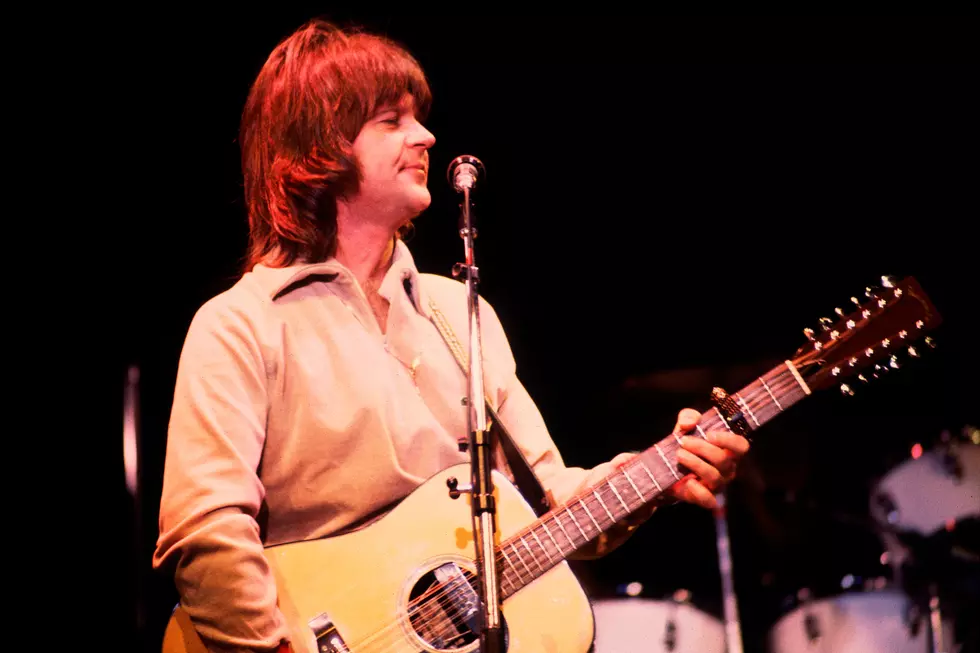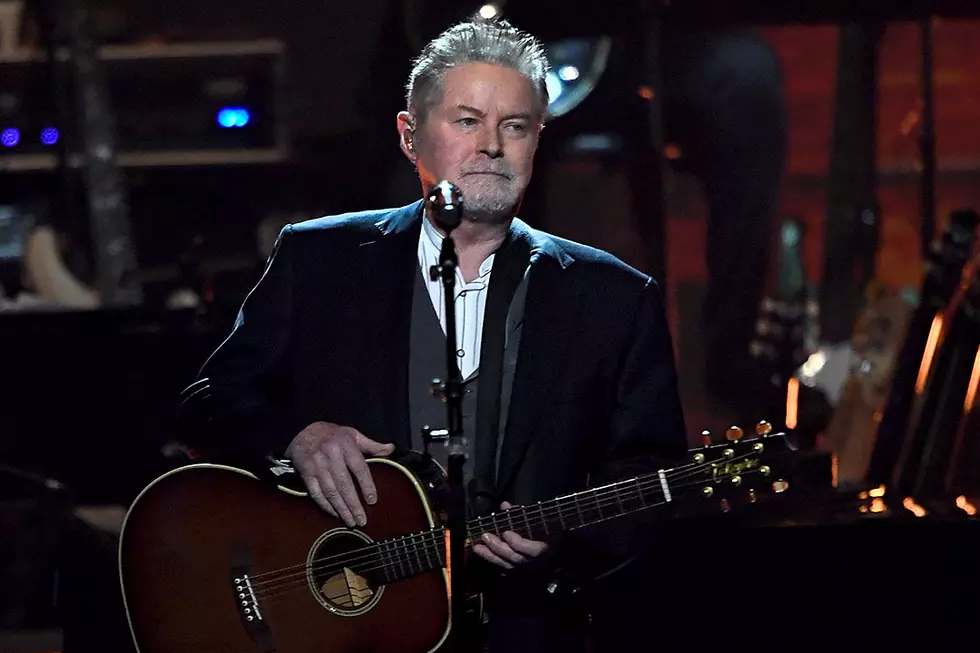
Illegal Eagle: How the Fake Randy Meisner Was Caught at Last
The best confidence tricksters, as seen on TV and in movies, will always say the trick is to play to expectations and not get too greedy.
So, if you’re going to pose as a member of the Eagles in order to score favors, don’t ask for too much and don’t pretend to be a leading figure like Joe Walsh. If you do, it’s likely to collapse around you rather quickly.
That was a lesson con man Lewis Peter Morgan learned well. In the mid-‘80s, he tried to persuade people he was Don Henley so he could get drinks, dinners, nights with women and gratis guitars. The problem was, at the time, Henley was touring in support of his second solo album, Building the Perfect Beast, and very much in the spotlight. Morgan, inevitably, was caught, arrested and bailed for $50,000. Then he went on the run.
But he was soon back to his old tricks. The Eagles connection seemingly worked for him, but he learned not to reach too far. Instead of impersonating Henley, he claimed to be former bassist Randy Meisner, and managed the act so well that he got away with it for a decade before being jailed in 1998.
Morgan was able to take advantage of the fact that Meisner, who left the band in 1977, was largely unknown except by name. The bassist didn’t enjoy the trappings of fame and, suffering from shyness, eventually refused to sing “Take It to the Limit,” the song he became best known for. That led to his departure. Since then, a series of health and addiction issues kept him out of the public eye, though he contributed to a wide range of other artists’ albums.
Watch Randy Meisner's 'Hearts on Fire' Video
Meisner’s bad fortune was Morgan’s good fortune. For nearly 10 years, he literally dined out pretending to be the bassist and conning fans out of everything he could get away with. In 1990, for example, SF Weekly reported that his performance was so convincing that a 29-year-old woman fell in love with him. Believing she was in a relationship with Meisner, the woman covered the costs of renting a car, shopping sprees and gambling trips to Las Vegas.
By the time Morgan ran out on her, she had run up a credit card bill of nearly $3,000. She even accepted his explanation that some people in the casinos they visited called him “Buddy” because that was the name he used for personal security reasons. She even drove him to Los Angeles Airport and loaned him a final $20 as he ran out, telling her he was flying to New York to take part in a dispute with a record label the Eagles never worked with.
A second target spent a weekend with Morgan, who said he had lost all his cash gambling and borrowed some from her. She also later attended a Meisner show and spoke to the real deal. “He was just kind of shocked that someone would be impersonating him,” the woman noted. Morgan had been reported to the police several times by now, but cops were unable to do much without more information on the con man’s identity. It was also suggested that, in order to be caught in the act, Meisner himself would have to be present to prove the trickster wasn’t whom he said he was.
Another potential victim, a 21-year-old woman, was suspicious when Morgan introduced himself as Meisner on a Greyhound bus. He explained it was a good way to travel without attracting attention. Six months later, she went to a Meisner show in the hope of catching up with him – only to realize the man onstage was not the man she'd met on the bus. She passed a note backstage, explaining the situation, and the real Meisner met her in his dressing room. “How much money does he owe you?” he asked her, explaining that the con had being going on for some time.
When Eagles reunited for their Hell Freezes Over tour in 1994, Meisner’s lack of involvement didn’t deter Morgan, who raised his game to take advantage of the new situation. He managed to persuade a custom guitar company to give him a $2,700 instrument in an endorsement deal. “He's as smooth as you would never believe,” said a company rep. “He was name-dropping profusely: 'Oh yeah, man, we did a concert with James Taylor. I'm down the road from Joe Walsh right now. We're gonna be doing rehearsals.’ … He's pressing all the buttons. Strategically amazing.”
Morgan sold the guitar soon afterward for $3,200, telling the music shop in question that, if they bought it, he’d secure a distribution deal with the manufacturer.
Another company was conned out of two basses, each worth more than $2,000. Morgan even had their serial numbers customized to include “R.M.” and called the makers two weeks after delivery to say how much he liked the instruments. That was the last they heard of him. A third business handed over $8,000 in guitars, even though Morgan played one and seemingly “couldn’t play for shit.”
Listen to Eagles Perform 'Take It to the Limit'
One of the basses with the custom serial number led to Morgan's downfall in 1997. A musician bought it from a pawn shop and called the manufacturer with a technical question, which led to a call with the cops. Strangely, Morgan signed his own name in the shop, left his real address and even supplied a fingerprint.
On Feb. 18, 1998, Morgan was arrested in a casino.
After being sentenced to 16 months in San Quentin State Prison, Morgan insisted the claims against him had been “fabrications,” adding that "the numbers are inflated.” A habitual criminal whose record stretched back to 1963, Morgan admitted that the Meisner con was a way of funding his gambling habit. San Francisco Police Department officer Curtis Cashen, who’d been chasing Morgan for four years, said, “If he had continued with Don Henley, I think people would have caught onto him a lot faster. To go to Meisner was an excellent choice.”
The real Meisner released a brief statement at the time, saying, “I'm just so happy that they finally caught him. Hopefully, he'll learn his lesson and quit.” Morgan, however, seems to have thought the odds were still good and was reported to be repeating the con in the 21st century – though with less effect since more people, especially in the casino industry, now know his past.
“The impostor certainly did his homework,” wrote gambling blogger Nolan Dalla about his run-in with Morgan in 2006. “First, he picked a band sure to be well-known by most of the people he targets. … Second, he impersonates the least-known member of the band, who left the group in the late 1970s. … Third, other than old photos taken way back when the Eagles were together and churning out hit records, virtually no one knows what the real Randy Meisner looks like (especially now). Finally, the impostor knows just enough about the group and its members to carry on a convincing conversation about what it was like to once be a ‘rock star.’”
Eventually unconvinced by Morgan’s attempts to secure funding for a gambling competition, Dalla and a friend took him out to dinner, then ran out on him, leaving Morgan to pay the bill. “A big rock star like him could certainly afford it," they said.
A newspaper report in 1998 observed that “Meisner has said he wonders if the impersonator caused bad blood with his former bandmates.” The total number of Morgan’s victims will never be known. But it could easily run into thousands of Eagles fans around the world.
Rock's Most Dysfunctional Bands
Six Little-Known Eagles 'Hotel California' Facts
More From Ultimate Classic Rock









